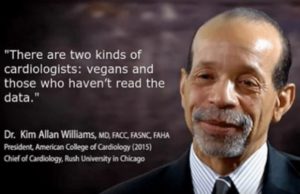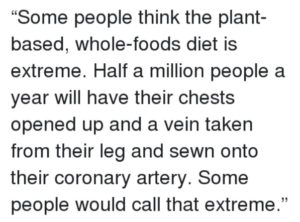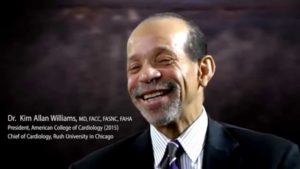
“There are two kinds of cardiologists: vegans and those who haven’t read the data.” Dr Kim Allan Williams is a remarkable man. As the first vegan president of the American College of Cardiology, what he says about the value of plant-based diets and the harms of meat-based diets is well-informed and evidence-based. Additionally, his well-earned high status within his field means that other medical professionals are more likely to sit up and listen when he speaks about plant-based nutrition.
A great fan of Dr C B Esselstyn and Dr Dean Ornish, Dr Williams regularly sends his cardiac patients to one or the other of these luminary plant-based clinicians so that they can take part in their disease reversal programmes.
Blog Contents
[su_quote]I don’t mind dying, but I don’t want it to be my fault.[/su_quote]
I have included a number of videos and a podcast where Dr Williams talks about his journey towards a plant-based diet. Whilst he doesn’t insist on a WFPB diet – suggesting that vegan cheese, vegan sausages, etc are better than any meat alternatives, even though they may not be optimal whole food nutrition – he is very clear that all animal products are harmful compared with plant products. These videos and his published research (some of which is outlined below) bear out his strong opinions on these matters.
(If you are viewing this on WP, the links to the videos are at the bottom of this page.)
Dr Kim Williams talks about being the first VEGAN President of the American College of Cardiology
Kim Allan Williams, MD, MACC, FAH: The Growing Acceptance of a PB Lifestyle by Cardiologists
Chef AJ Teleclass with Kim A. Williams, MD
Audio-only YT video. Well-worth listening to.
Meat Your Future – Interview with Kim A. Williams, Sr., MD (EXTENDED VERSION)
Dr Kim Williams talks about the Government’s Dietary Recommendations
 Dr Williams quote.
Dr Williams quote.
Nutrition and Cardiovascular Mortality (Kim Allan Williams, Sr., MD) Jan 5, 2017
Is a Whole Food Plant-Based Diet an Answer to Chronic Disease? 2017 Documentary
A Sample from Dr Williams’ Full List of Published Research
“The real question about WFPB diet is ‘What doesn’t it cure?’ ” (Quote from Dr Williams)
1. Introduction to the “A plant-based diet and cardiovascular disease” special issue. 2017
“All truth passes through three stages. First, it is ridiculed. Second, it is violently opposed. Third, it is accepted as being self-evident.” (Arthur Schopenhauer, German Philosopher, 1788–1866).
Unlike many of our cardiovascular prevention and treatment strategies, including antioxidants, vitamin E, folic acid and niacin to name a few, that have disintegrated over time, the “truth” (i.e., evidence) for the benefits of plant-based nutrition continues to mount. This now includes lower rates of stroke, hypertension, diabetes mellitus, obesity, myocardial infarction and mortality, as well as many non-cardiac issues that affect our patients in cardiology, ranging from cancer to a variety of inflammatory conditions. Challenges with the science are, however, less daunting to overcome than inertia, culture, habit and widespread marketing of unhealthy foods. Our goal must be to get data out to the medical community and the public where it can actually change lives—creating healthier and longer ones.
In 2015, cardiovascular mortality went up in the US for the first time in over four decades. We apparently have reached the tipping point in cardiology. The effects of our guideline-driven management for treatment of heart disease and its risk factors, and the benefits of our ever-more-creative interventions on acute events seem to have plateaued. The rising epidemic of obesity and diabetes is now outstripping our preventive efforts, adding to the cost of healthcare and costing lives.
Starting with 2017 data, our Medicare Access and CHIP Reauthorization Act of 2015 (MACRA) merit-based incentive payments and alternative payment models will be rewarding the absence of events more and more, and procedures less and less. So isn’t it time to move upstream, and place more emphasis on prevent-mode and less event-mode in our practices? Reading the existing literature and evaluating the impact of plant-based nutrition, it clearly represents the single most important yet underutilized opportunity to reverse the pending obesity and diabetes induced epidemic of morbidity and mortality.
2. A plant-based diet and hypertension. 2017.
There are a variety of mechanisms proposed by which plant-based nutrition leads to decrease in blood pressure. They include improved vasodilation,[10-13] greater antioxidant content and anti-inflammatory effects,[14-21] improved insulin sensitivity,[10, 22-25] decreased blood viscosity,[26, 27] altered baroreceptors,[10] modifications in both the renin-angiotensin,[13, 28-30] and sympathetic nervous systems,[10, 31] and modification of the gut microbiota.[30]
Long-term randomised controlled trials examining the impact of plant-based diets on various health outcomes, including hypertension, will further inform medical guideline creation and refine our understanding of the relationship between diet and disease. However, in lieu of such information and in the context of the data within this Special Issue, we believe that consuming a diet that is mostly or exclusively plant-based appears prudent for the prevention and treatment of hypertension.
3. A Deficiency of Nutrition Education and Practice in Cardiology. 2017
Results:
A total of 930 surveys were completed. Among cardiologists, 90% reported receiving no or minimal nutrition education during fellowship training, 59% reported no nutrition education during internal medicine training, and 31% reported receiving no nutrition education in medical school. Among cardiologists, 8% described themselves as having “expert” nutrition knowledge. Nevertheless, fully 95% of cardiologists believe that their role includes personally providing patients with at least basic nutrition information. The percentage of respondents who ate ≥5 servings of vegetables and fruits per day was: 20% (cardiologists), 21% (fellows-in-training), and 26% (cardiovascular team members).
Conclusions:
A large proportion of cardiovascular specialists have received minimal medical education and training in nutrition, and current trainees continue to experience significant education and training gaps.
4. The 2015 Dietary Guidelines Advisory Committee Report Concerning Dietary Cholesterol. 2015
Abstract:
The most recent 2015 Dietary Guidelines Advisory Committee report indicated that “cholesterol is not considered a nutrient of concern for overconsumption.” However, this statement may be too general as it does not acknowledge conflicting findings in literature regarding cardiovascular risk in certain populations. Current research suggests that dietary cholesterol may increase an subject’s risk of developing diabetes, increases a diabetic patient’s risk of cardiovascular disease, and may worsen coronary risk factors in subjects who are “hyper-responders” to dietary cholesterol. In conclusion, we suggest that a more cautious approach to dietary cholesterol intake is warranted, especially in high-risk populations.

Podcast with Dr Williams
Dr. Kim Williams And Jeremy Glogower Get Real About Going Plant-Based, Seven Rules We Can All Live By And More…
 About Kim Allan Williams MD, MACC, FAHA, MASNC, FESC
About Kim Allan Williams MD, MACC, FAHA, MASNC, FESC
Dr Williams was born in Chicago, and attended the College of The University of Chicago (1971 to 1975), followed by the University of Chicago’s Pritzker School of Medicine (1975 to 1979), internal medicine residency at Emory University (1979 to 1982), and overlapping fellowships in Cardiology at the University of Chicago (1982 to 1985), Clinical Pharmacology (1984 to 1985), and Nuclear Medicine (1984 to 1986). He is board certified in Internal Medicine, Cardiovascular Diseases, Nuclear Medicine, Nuclear Cardiology and Cardiovascular Computed Tomography.
Dr. Williams joined the faculty of the University of Chicago in 1986, specialising in clinical cardiology, nuclear medicine and nuclear cardiology. He served as Professor of Medicine and Radiology and Director of Nuclear Cardiology at The University of Chicago School of Medicine until 2010. Among numerous awards and honours for his teaching in the medical school, residencies and fellowships, he was elected to Alpha Omega Alpha in 2008.
In 2010, he became the Dorothy Susan Timmis Endowed Professor of Medicine and Radiology and Chairman of the Division of Cardiology at Wayne State University School of Medicine in Detroit, MI. At Wayne State, he has started the Urban Cardiology Initiative – a program of education of physicians on disparities in healthcare, primary school education on cardiovascular health and community health screening in inner city Detroit. In November, 2013 he returned to Chicago as the James B. Herrick Endowed Professor of Medicine and Cardiology at Rush University Medical Center.
Dr. Williams has published numerous peer reviewed articles, monographs, book chapters, editorials, and review articles in the field of nuclear cardiology and minority health issues, with emphasis on education and innovations in perfusion imaging and quantitation of ventricular function. His research interests include selective adenosine receptor agonists, fluorinated perfusion PET imaging, cardiac computed tomography for plaque characterisation, health care disparities and payment policy, and appropriate use of cardiac imaging.
Dr. Williams has served on numerous committees and boards at the national level, including the American Society of Nuclear Cardiology (ASNC), the American Heart Association (AHA), the American Medical Association (AMA), the American College of Cardiology (ACC), the Certifying Board of Nuclear Cardiology, the Certifying Board of Cardiac Computed Tomography, the Society of Cardiovascular Computed Tomography and the Association of Black Cardiologists (ABC). He served as President of ASNC from 2004 to 2005. He served as Chairman of the Board of ABC from 2008 to 2010. He also served on the Cardiovascular Disease Examination Board of the American Board of Internal Medicine (ABIM-CV) until 2012. He served as the president of the ACC from 2015 to 2016.
References
- Video: Dr Kim Williams talks about being the first VEGAN President of the American College of Cardiology (https://www.youtube.com/watch?v=nyNy2mSnNRo). Published by Dr John McDougall.
- Video: Kim Allan Williams, MD, MACC, FAH: The Growing Acceptance of a PB Lifestyle by Cardiologists (https://www.youtube.com/watch?v=_KeGHwDRX6g). Published by PlantPure Nation/TV.
- Audio-only Video: Chef AJ Teleclass with Kim A. Williams, MD (https://www.youtube.com/watch?v=ebcX7N4yvEo&feature=youtu.be). Published by Charles Shrewsbury.
- Video: Meat Your Future – Interview with Kim A. Williams, Sr., MD (EXTENDED VERSION) (https://youtu.be/0SXqD6Y99PU). Published by Meat Your Future.
- Video: Dr Kim Williams talks about the Government’s Dietary Recommendations (https://www.youtube.com/watch?v=yW7ljppz5JQ&feature=youtu.be). Published by Dr John McDougall.
- Video: Nutrition and Cardiovascular Mortality (Kim Allan Williams, Sr., MD) Jan 5, 2017 (https://www.youtube.com/watch?v=ZLtvkuUZUvE&feature=youtu.be). Published by DeBakey Institute For Cardiovascular Education & Training.
- Video: Is a Whole Food Plant-Based Diet an Answer to Chronic Disease? 2017 Documentary (https://www.youtube.com/watch?v=xl8zNztsoGg&feature=youtu.be). Published by Plant Based News.
- Kim Allan Williams. Introduction to the “A plant-based diet and cardiovascular disease” special issue. J Geriatr Cardiol. 2017 May; 14(5): 316. doi: 10.11909/j.issn.1671-5411.2017.05.001. PMCID: PMC5466935.
- Sarah Alexander, Robert J Ostfeld, Kathleen Allen, Kim A Williams. A plant-based diet and hypertension. J Geriatr Cardiol. 2017 May; 14(5): 327–330. doi: 10.11909/j.issn.1671-5411.2017.05.014. PMCID: PMC5466938.
-
Suter PM, Sierro C, Vetter W. Nutritional factors in the control of blood pressure and hypertension. Nutr Clin Care. 2002;5:9–19. [PubMed].
-
Vogel RA, Corretti MC, Plotnick GD. Effect of a single high-fat meal on endothelial function in healthy subjects. Am J Cardiol. 1997;79:350–354. [PubMed].
-
Hodgson JM. Effects of tea and tea flavonoids on endothelial function and blood pressure: a brief review. Clin Exp Pharmacol Physiol. 2006;33:838–841. [PubMed].
-
Yokoyama Y, Nishimura K, Barnard ND, et al. Vegetarian diets and blood pressure: a meta-analysis. JAMA Intern Med. 2014;174:577–587. [PubMed].
-
Baradaran A, Nasri H, Rafieian-Kopaei M. Oxidative stress and hypertension: Possibility of hypertension therapy with antioxidants. J Res Med Sci. 2014;19:358–367. [PMC free article] [PubMed].
-
Manning RD, Jr, Tian N, Meng S. Oxidative stress and antioxidant treatment in hypertension and the associated renal damage. Am J Nephrol. 2005;25:311–317. [PubMed].
-
Galleano M, Pechanova O, Fraga CG. Hypertension, nitric oxide, oxidants, and dietary plant polyphenols. Curr Pharm Biotechnol. 2010;11:837–848. [PubMed].
-
Turner-McGrievy GM, Wirth MD, Shivappa N, et al. Randomization to plant-based dietary approaches leads to larger short-term improvements in dietary inflammatory index scores and macronutrient intake compared with diets that contain meat. Nutr Res. 2015;35:97–106. [PubMed].
-
Watzl B. Anti-inflammatory effects of plant-based foods and of their constituents. Int J Vitam Nutr Res. 2008;78:293–298. [PubMed].
-
Pauletto P, Rattazzi M. Inflammation and hypertension: the search for a link. Nephrol Dial Transplant. 2006;21:850–853. [PubMed].
-
Asgary S, Afshani MR, Sahebkar A, et al. Improvement of hypertension, endothelial function and systemic inflammation following short-term supplementation with red beet (Beta vulgaris L.) juice: a randomized crossover pilot study. J Hum Hypertens. 2016;30:627–632. [PubMed].
-
Upadhyay S, Dixit M. Role of polyphenols and other phytochemicals on molecular signaling. Oxid Med Cell Longev. 2015;2015:504253. [PMC free article] [PubMed].
-
Zhou MS, Wang A, Yu H. Link between insulin resistance and hypertension: What is the evidence from evolutionary biology? Diabetol Metab Syndr. 2014;6:12. [PMC free article] [PubMed].
-
Viguiliouk E, Stewart SE, Jayalath VH, et al. Effect of replacing animal protein with plant protein on glycemic control in diabetes: a systematic review and meta-analysis of randomized controlled trials. Nutrients. 2015;7:9804–9824. [PMC free article] [PubMed].
-
Anderson JW, Ward K. High-carbohydrate, high-fiber diets for insulin-treated men with diabetes mellitus. Am J Clin Nutr. 1979;32:2312–2321. [PubMed].
-
Eddouks M, Bidi A, El Bouhali B, et al. Antidiabetic plants improving insulin sensitivity. J Pharm Pharmacol. 2014;66:1197–1214. [PubMed].
-
Ernst E, Pietsch L, Matrai A, Eisenberg J. Blood rheology in vegetarians. Br J Nutr. 1986;56:555–560.[PubMed].
-
McCarty MF. Favorable impact of a vegan diet with exercise on hemorheology: implications for control of diabetic neuropathy. Med Hypotheses. 2002;58:476–486. [PubMed].
-
Chen Q, Turban S, Miller ER, Appel LJ. The effects of dietary patterns on plasma renin activity: results from the dietary approaches to stop hypertension trial. J Hum Hypertens. 2012;26:664–669. [PubMed].
-
Dizdarevic LL, Biswas D, Uddin MD, et al. Inhibitory effects of kiwifruit extract on human platelet aggregation and plasma angiotensin-converting enzyme activity. Platelets. 2014;25:567–575. [PubMed].
-
Marques FZ, Nelson EM, Chu PY, et al. High fibre diet and acetate supplementation change the gut microbiota and prevent the development of hypertension and heart failure in DOCA-salt hypertensive mice. Circulation. Published Online First: December 7, 2016. DOI: 10.1161/CIRCULATIONAHA.116.024545. [PubMed].
-
Park SK, Tucker KL, O’Neill MS, et al. Fruit, vegetable, and fish consumption and heart rate variability: the Veterans Administration Normative Aging Study. Am J Clin Nutr. 2009;89:778–786.[PMC free article] [PubMed].
- Full list of Dr Kim A Williams publications: (https://www.ncbi.nlm.nih.gov/pubmed/?term=kim+a+williams).
- Devries S, Agatston A, Aggarwal M, Aspry KE, Esselstyn CB, Kris-Etherton P, Miller M, O’Keefe JH, Ros E, Rzeszut AK, White BA, Williams KA, Freeman AM. A Deficiency of Nutrition Education and Practice in Cardiology. Am J Med. 2017 Nov;130(11):1298-1305. doi: 10.1016/j.amjmed.2017.04.043. Epub 2017 May 25. PMID: 28551044.
- Williams KA Sr, Krause AJ, Shearer S, Devries S. The 2015 Dietary Guidelines Advisory Committee Report Concerning Dietary Cholesterol. Am J Cardiol. 2015 Nov 1;116(9):1479-80. doi: 0.1016/j.amjcard.2015.07.077. Epub 2015 Aug 14. PMID: 26341187.